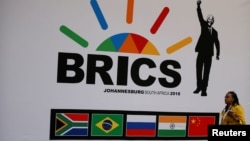The BRICS group of developing economies – Brazil, Russia, India, China, and South Africa – meet in Johannesburg from Tuesday to Thursday for their annual summit, during which expansion of the bloc is expected to figure high on the agenda.
On the surface, the members of this bloc have little in common. Brazil, India and South Africa are democracies, while China and Russia are autocracies. However, one thing they do share is a disillusionment with the current U.S.-led world order and a desire to create an alternative in which the Global South has more clout.
If the number of new countries looking to join the bloc is any indication, this is proving to be a popular idea. Some 40 nations, including Argentina, Iran, Saudi Arabia and the United Arab Emirates are all interested in joining, and discussions about new members will likely feature high on the agenda of the summit, with BRICS members differing on the benefits of expansion.
While some analysts, including Jim O’Neill, the former Goldman Sachs economist who coined the acronym, say the group has not actually achieved much since its founding in 2009, Mikatekiso Kubayi, a researcher at the Institute for Global Dialogue at the University of South Africa, disputes that.
“There are over 40 countries that have expressed an interest in joining BRICS,” said Kubayi. "Clearly those more than 40 countries have seen something, you know, some sort of benefit or use or value of BRICS to want to join it.”
And this is how South Africa’s Minister for International Relations and Cooperation Naledi Pandor put it last week.
“The current geopolitical context has driven renewed interest in BRICS membership as countries of the Global South look for alternatives in a multipolar world.”
Steven Gruzd, an analyst at the South African Institute of International affairs, said if more nondemocratic states join it could make the bloc more stridently anti-Western.
“Certainly, if BRICS expands and includes countries like Iran, this will definitely enhance the anti-Western tone and tenor of discussions,” said Gruzd.
Already, BRICS accounts for some 40% of the world’s population, and an estimated one-quarter of global gross domestic product. In terms of purchasing power parity, BRICS countries now have a larger share of global economic activity than G-7 countries.
A previously touted BRICS common currency is not something that will be discussed, according to South African organizers. However, the bloc’s New Development Bank does want to de-dollarize.
“The other issue that’s going to be talked about is the currencies that countries trade in and talk about more trade in local currencies rather than U.S. dollars,” said Gruzd.
Presidents Cyril Ramaphosa of South Africa and Xi Jinping of China, Indian Prime Minister Narendra Modi and President Luiz Inacio Lula da Silva of Brazil have all confirmed their attendance. Russia will be sending Foreign Minister Sergey Lavrov, while President Vladimir Putin will be taking part remotely as he is wanted for war crimes in Ukraine by the International Criminal Court.
As a signatory to the court, Pretoria would be obliged to arrest Putin if he entered the country, a diplomatic nightmare they have now avoided.
Separately, Ramaphosa will host Xi on the sidelines of the summit for an official state visit. China is South Africa’s biggest trading partner.







